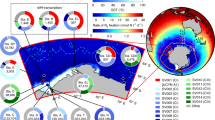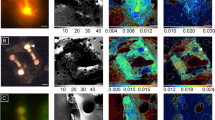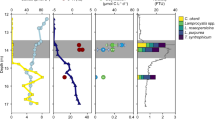Abstract
Nitrogen (N2) fixation in oligotrophic surface waters is the main source of new nitrogen (N) to the ocean1 and plays a key role in fueling the biological carbon pump2. Oceanic N2 fixation is almost exclusively attributed to cyanobacteria, even though genes encoding nitrogenase, the enzyme fixing N2 into ammonia, are widespread among marine bacteria and archaea3-5. Little is known about these non-cyanobacterial N2-fixers and direct proof that they can fix N in the ocean is missing. Here we report the discovery of a non-cyanobacterial N2-fixing symbiont, Candidatus Tectiglobus diatomicola, which provides its diatom host with fixed-N in return for photosynthetic carbon. The N2-fixing symbiont belongs to the order Rhizobiales and its association with a unicellular diatom expands the known hosts for this order beyond the well-known N2-fixing rhizobia-legume symbioses on land6. Our results show that the rhizobia-diatom symbiosis can contribute as much fixed-N as cyanobacterial N2-fixers in the tropical North Atlantic, and that they may be responsible for N2 fixation in the vast regions of the ocean where cyanobacteria are too rare to account for the measured rates.
This is a preview of subscription content, access via your institution
Access options
Access Nature and 54 other Nature Portfolio journals
Get Nature+, our best-value online-access subscription
$29.99 / 30 days
cancel any time
Subscribe to this journal
Receive 51 print issues and online access
$199.00 per year
only $3.90 per issue
Rent or buy this article
Prices vary by article type
from$1.95
to$39.95
Prices may be subject to local taxes which are calculated during checkout
Similar content being viewed by others
Author information
Authors and Affiliations
Corresponding author
Supplementary information
Supplementary Information
This file contains Supplementary Methods Supplementary Discussion and Supplementary References.
Supplementary Table 1
This file contains Supplementary Table 1 which lists the genome annotation and transcriptome counts of Ca. T. diatomicola.
Supplementary Table 2
This file contains Supplementary Table 2 which lists Haslea spp. contigs identified in the metagenome assembly.
Supplementary Table 3
This file contains Supplementary Table 3 which lists the presence/absence of KEGG modules in the two Ca. Tectiglobus (diatomicola and profundi) genomes and genomes of other Hyphomicrobiaceae.
Supplementary Table 4
This file contains Supplementary Table 4 which lists metagenomes used for the global distribution analysis.
Supplementary Table 5
This file contains Supplementary Table 5 which lists the genome annotation of Ca. T. profundi.
Supplementary Data 1-9
These are tree files corresponding to the phylogenetic trees shown in Fig.1 and Extended Data Figs. 2 and 3.
Rights and permissions
About this article
Cite this article
Tschitschko, B., Esti, M., Philippi, M. et al. Rhizobia–diatom symbiosis fixes missing nitrogen in the ocean. Nature (2024). https://doi.org/10.1038/s41586-024-07495-w
Received:
Accepted:
Published:
DOI: https://doi.org/10.1038/s41586-024-07495-w
Comments
By submitting a comment you agree to abide by our Terms and Community Guidelines. If you find something abusive or that does not comply with our terms or guidelines please flag it as inappropriate.



